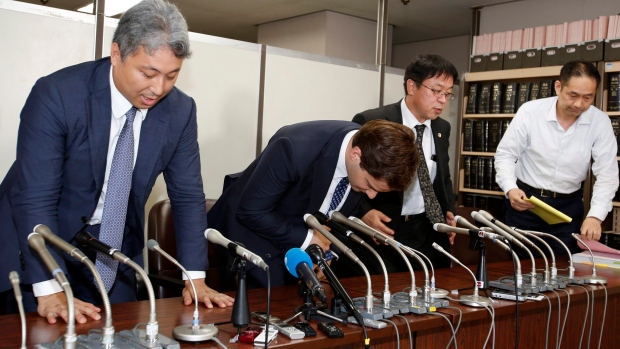Jan 25, 2018
‘People could lose their shirts’: Canada urged to regulate cryptocurrencies
When Howard Wetston was still running Canada's largest financial regulator back in 2015, the Canadian Senate published a report that addressed the question authorities around the world are scrambling to answer three years later: how to regulate cryptocurrencies.
"That was when bitcoin was still on the margins," the former Ontario Securities Commission Chair recalled in a telephone interview with BNN. Now a Senator himself and a member of the Standing Committee on Banking, Trade and Commerce, Wetston argues the so-called chamber of sober second thought should give their report a second look.
"It is time to review this report from three years ago," Wetston said, noting the June 2015 report itself recommends its conclusions be reviewed "to assess the appropriateness of the regulatory environment in the next three years."
"We need to account for all that has occurred since then," Wetston said, "and there has been a lot."
Bitcoin, in particular, is over 20 times more valuable today than it was in 2015. More broadly, the cryptocurrency space has evolved from a few dozen coins and tokens to well over a thousand digital currencies, pushing the sector's total valuation well into the hundreds of billions of U.S. dollars and prompting calls for regulators to step in and ensure investors are being protected.
"I see a problem on the horizon, and unless there is a reasonable regulatory framework in place... there could be a huge loss to investors," Wetston said. "People could lose their shirts."
Even as recently as last year, in early 2017 "you didn't have a lot of regulatory positions being taken because it was still such a new area," Pat Chaukos, chief of the OSC's LaunchPad initiative - established to help companies using new financial technologies raise money without running afoul of the rules - told BNN via telephone.
"But there has been a real swing recently [as] we've seen a huge increase in the number of coin and token offerings and the amount of products based on the underlying [blockchain] technology."
Globally, some jurisdictions have reacted swiftly, and perhaps rashly, to the rapid proliferation of initial coin offerings (ICOs) and bitcoin-related products and services by banning all cryptocurrency trading within their borders. Others, most notably South Korea, have added to bitcoin's extreme price volatility simply by raising the possibility of such a ban.
Those bans are "an overreaction," former federal Finance Minister Joe Oliver told BNN in a telephone interview this week, adding rhetorically: "Are people banned from gambling there? Can they no longer buy lottery tickets?"
Wetston also equates investing directly in cryptocurrencies to gambling. However, Wetston, Oliver and the OSC's Chaukos all argue that various cryptocurrency trading platforms that exist around the world, as well as companies that offer investors a coin or token instead of a direct ownership stake in the company via shares (as is the case with ICOs), must be required to follow at least a basic framework of rules.
There is a growing list of examples of what can happen when there are no rules in place. Perhaps the most infamous case being Mt. Gox: one of the first bitcoin exchanges that went bankrupt in 2014 after nearly US$500 million worth of digital currency mysteriously vanished from the platform. Last summer, the former CEO of the exchange was arrested in Japan on allegations he embezzled the missing funds.

And just last week, the BitConnect exchange abruptly shut down after two U.S. state regulators sent cease-and-desist orders. Investors are now attempting to file a class lawsuit in hopes of recovering their funds from what they claim was effectively a Ponzi scheme.
"There are issues of transparency, volatility, valuation, custody, liquidity, unregulated cryptocurrency exchanges, potential for illegal schemes; and, certainly in a lot of cases, investors don't have a fundamental understanding of what they're getting into," Oliver said. "Those are all very legitimate issues that the securities commissions should be concerned about in the context of investor protection."
Key among the Senate's recommendations from 2015 was a "regulatory 'light touch' that minimizes actions that might stifle the development of these new technologies".
That is precisely the sort of regulation Chaukos says the OSC is pursuing. The regulator has spent much of the past year working with various entities - from investment funds that are seeking to hold cryptocurrencies, cryptocurrency exchanges and trading platforms - in hopes of establishing a basic set of protections around anti-money laundering and client identification policies.
- Bitcoin may split 50 times in 2018 as 'forking' spikes
- Online lender Mogo Finance Technology to begin bitcoin mining with DMG Blockchain Solutions
- Hype vs. regulatory reality as firms race for first Bitcoin ETF
READ MORE: CRYPTOCURRENCIES
Speaking to Bloomberg News at the World Economic Forum in Davos earlier this week, Finance Minister Bill Morneau said the government is taking a crime-prevention approach to potential cryptocurrency regulation.
“We want to make sure we are not introducing any major risks into our economy, whether they be risks like money laundering or terrorist financing,” he said.
Yet a major part of the challenge for regulators both at home and abroad is getting cryptocurrency players to talk to regulators in the first place.
"They want to avoid regulation, they don't like the idea of central authorities and governments," Chaukos said. "There is this idea that regulators want to get in the way... but what we actually want is to foster innovative ways to raise capital while making sure we balance that with ways to protect investors."
Until that balance is struck, Canadian crypto investors will be left to fend for themselves.
"If you don't even know who to go to until something goes wrong, that is not good for our capital markets and I don't think any investor wants to be in that situation," said Chaukos. "There really are no rights for investors or protections for investors in place right now."






